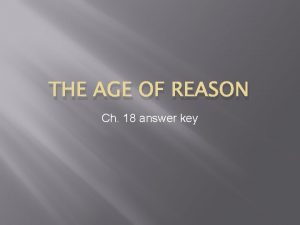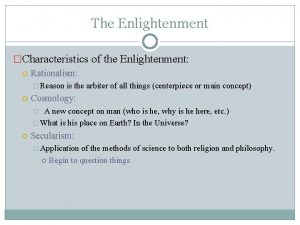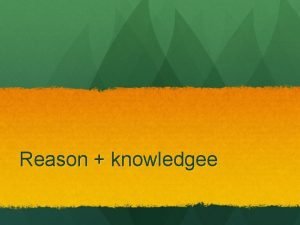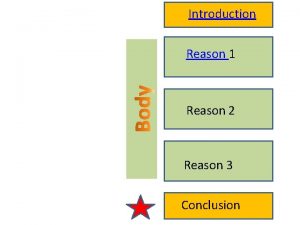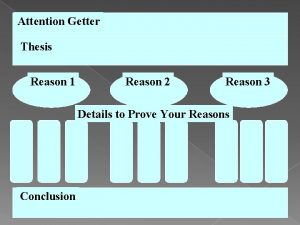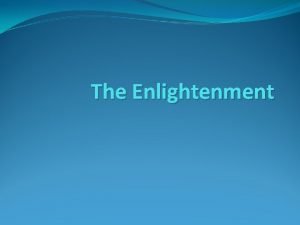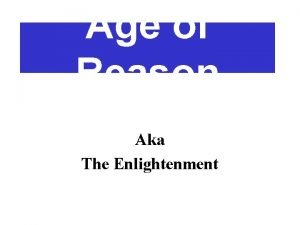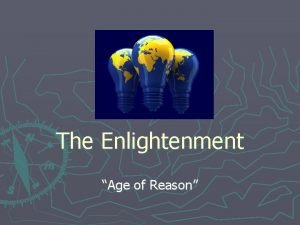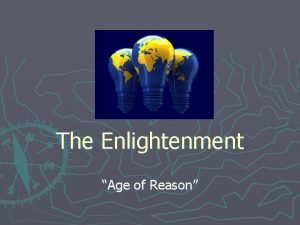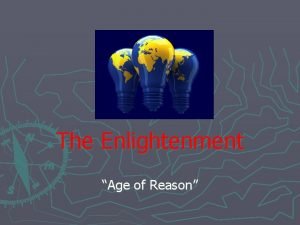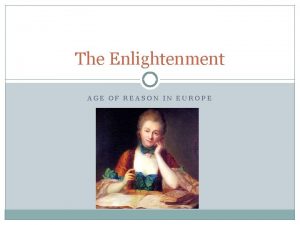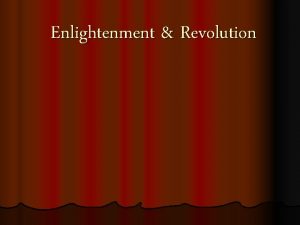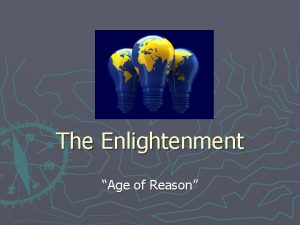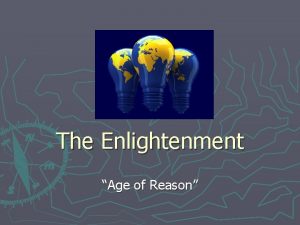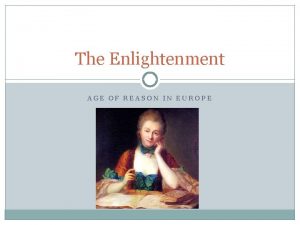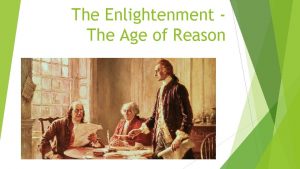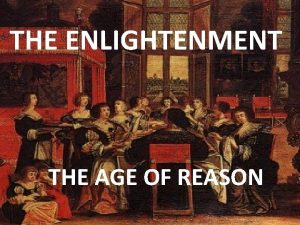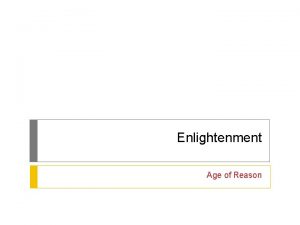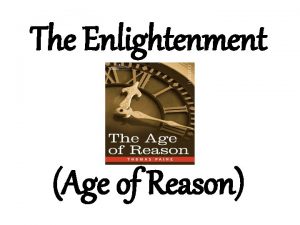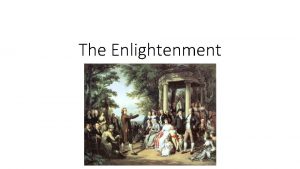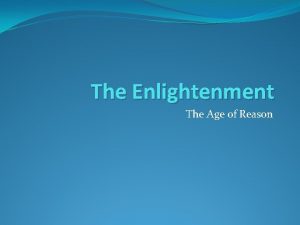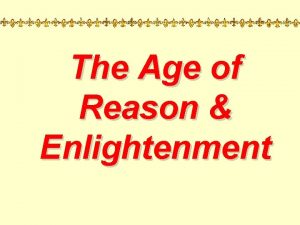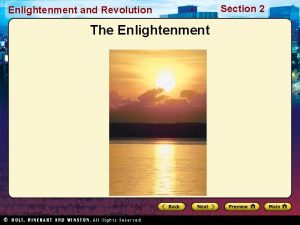Enlightenment n Characteristics of the Enlightenment 1 Reason

























- Slides: 25






Enlightenment n Characteristics of the Enlightenment: 1) Reason should control your actions, not dogma. Don't believe something just because it's traditional. 2) Doubt everything, lead to Locke's concept of political rights. 3) Linked to development of modern science, e. g. , Immanuel Kant. 4) Important figures - Descartes, John Locke, Leibnitz, John Stuart Mill, David Hume, Adam Smith, John Milton. n The Enlightenment defined and celebrated modern ideas about reason and rationalism








Foucault: What is Enlightenment? n Kant indicates right away that the 'way out' that characterizes Enlightenment is a process that releases us from the status of 'immaturity. ' And by 'immaturity, ' he means a certain state of our will that makes us accept someone else's authority to lead us in areas where the use of reason is called for. Kant gives three examples: we are in a state of 'immaturity' when a book takes the place of our understanding, when a spiritual director takes the place of our conscience, when a doctor decides for us what our diet is to be.

Private Use and Public Use of Reason n n What constitutes, for Kant, this private use of reason? In what area is it exercised? Man, Kant says, makes a private use of reason when he is 'a cog in a machine'; that is, when he has a role to play in society and jobs to do: to be a soldier, to have taxes to pay, to be in charge of a parish, to be a civil servant, all this makes the human being a particular segment of society; he finds himself thereby placed in a circumscribed position, where he has to apply particular rules and pursue particular ends. Kant does not ask that people practice a blind and foolish obedience, but that they adapt the use they make of their reason to these determined circumstances; and reason must then be subjected to the particular ends in view. Thus there cannot be, here, any free use of reason. On the other hand, when one is reasoning only in order to use one's reason, when one is reasoning as a reasonable being (and not as a cog in a machine), when one is reasoning as a member of reasonable humanity, then the use of reason must be free and public. Enlightenment is thus not merely the process by which individuals would see their own personal freedom of thought guaranteed. There is Enlightenment when the universal, the free, and the public uses of reason are superimposed on one another.

Enlightenment and Critiques n I believe that it is necessary to stress the connection that exists between this brief article and the three Critiques. Kant in fact describes Enlightenment as the moment when humanity is going to put its own reason to use, without subjecting itself to any authority; now it is precisely at this moment that the critique is necessary, since its role is that of defining the conditions under which the use of reason is legitimate in order to determine what can be known, what must be done, and what may be hoped. Illegitimate uses of reason are what give rise to dogmatism and heteronomy, along with illusion; on the other hand, it is when the legitimate use of reason has been clearly defined in its principles that its autonomy can be assured. The critique is, in a sense, the handbook of reason that has grown up in Enlightenment; and, conversely, the Enlightenment is the age of the critique.

Modernity: an Attitude not a Period n Thinking back on Kant's text, I wonder whether we may not envisage modernity rather as an attitude than as a period of history. And by 'attitude, ' I mean a mode of relating to contemporary reality; a voluntary choice made by certain people; in the end, a way of thinking and feeling; a way, too, of acting and behaving that at one and the same time marks a relation of belonging and presents itself as a task. A bit, no doubt, like what the Greeks called an ethos. And consequently, rather than seeking to distinguish the 'modern era' from the 'premodern' or 'postmodern, ' I think it would be more useful to try to find out how the attitude of modernity, ever since its formation, has found itself struggling with attitudes of 'countermodernity. '

philosophical interrogation n I have been seeking, on the one hand, to emphasize the extent to which a type of philosophical interrogation -- one that simultaneously problematizes man's relation to the present, man's historical mode of being, and the constitution of the self as an autonomous subject -- is rooted in the Enlightenment. On the other hand, I have been seeking to stress that the thread that may connect us with the Enlightenment is not faithfulness to doctrinal elements, but rather the permanent reactivation of an attitude -that is, of a philosophical ethos that could be described as a permanent critique of our historical era.

Enlightenment: as an Historical Event and Process n n This permanent critique of ourselves has to avoid the always too facile confusions between humanism and Enlightenment. We must never forget that the Enlightenment is an event, or a set of events and complex historical processes, that is located at a certain point in the development of European societies. As such, it includes elements of social transformation, types of political institution, forms of knowledge, projects of rationalization of knowledge and practices, technological mutations that are very difficult to sum up in a word, even if many of these phenomena remain important today. The one I have pointed out and that seems to me to have been at the basis of an entire form of philosophical reflection concerns only the mode of reflective relation to the present.

What is Humanism? n Humanism is something entirely different. It is a theme or rather a set of themes that have reappeared on several occasions over time in European societies; these themes always tied to value judgments have obviously varied greatly in their content as well as in the values they have preserved. Furthermore they have served as a critical principle of differentiation. In the seventeenth century there was a humanism that presented itself as a critique of Christianity or of religion in general; there was a Christian humanism opposed to an ascetic and much more theocentric humanism. In the nineteenth century there was a suspicious humanism hostile and critical toward science and another that to the contrary placed its hope in that same science. Marxism has been a humanism; so have existentialism and personalism; there was a time when people supported the humanistic values represented by National Socialism and when the Stalinists themselves said they were humanists.

Enlightenment and humanism in a state of tension rather than identity n Now in this connection I believe that this thematic which so often recurs and which always depends on humanism can be opposed by the principle of a critique and a permanent creation of ourselves in our autonomy: that is a principle that is at the heart of the historical consciousness that the Enlightenment has of itself. From this standpoint I am inclined to see Enlightenment and humanism in a state of tension rather than identity.

critical question today has to be turned back into a positive one This philosophical ethos may be characterized as a limitattitude. We are not talking about a gesture of rejection. We have to move beyond the outside-inside alternative; we have to be at the frontiers. Criticism indeed consists of analyzing and reflecting upon limits. But if the Kantian question was that of knowing what limits knowledge has to renounce transgressing, it seems to me that the critical question today has to be turned back into a positive one: in what is given to us as universal necessary obligatory what place is occupied by whatever is singular contingent and the product of arbitrary constraints? The point in brief is to transform the critique conducted in the form of necessary limitation into a practical critique that takes the form of a possible transgression.

Genealogy and Archaeology n This entails an obvious consequence: that criticism is no longer going to be practiced in the search formal structures with universal value, but rather as a historical investigation into the events that have led us to constitute ourselves and to recognize ourselves as subjects of what we are doing, thinking, saying. In that sense, this criticism is not transcendental, and its goal is not that of making a metaphysics possible: it is genealogical in its design and archaeological in its method. Archaeological -- and not transcendental -- in the sense that it will not seek to identify the universal structures of all knowledge or of all possible moral action, but will seek to treat the instances of discourse that articulate what we think, say, and do as so many historical events. And this critique will be genealogical in the sense that it will not deduce from the form of what we are what it is impossible for us to do and to know; but it will separate out, from the contingency that has made us what we are, the possibility of no longer being, doing, or thinking what we are, do, or think. It is not seeking to make possible a metaphysics that has finally become a science; it is seeking to give new impetus, as far and wide as possible, to the undefined work of freedom.


 The enlightenment (age of reason) answer key pdf
The enlightenment (age of reason) answer key pdf Enlightenment characteristics
Enlightenment characteristics Characteristics of enlightenment
Characteristics of enlightenment Hát kết hợp bộ gõ cơ thể
Hát kết hợp bộ gõ cơ thể Slidetodoc
Slidetodoc Bổ thể
Bổ thể Tỉ lệ cơ thể trẻ em
Tỉ lệ cơ thể trẻ em Chó sói
Chó sói Tư thế worm breton là gì
Tư thế worm breton là gì Chúa sống lại
Chúa sống lại Các môn thể thao bắt đầu bằng từ đua
Các môn thể thao bắt đầu bằng từ đua Thế nào là hệ số cao nhất
Thế nào là hệ số cao nhất Các châu lục và đại dương trên thế giới
Các châu lục và đại dương trên thế giới Công thức tính độ biến thiên đông lượng
Công thức tính độ biến thiên đông lượng Trời xanh đây là của chúng ta thể thơ
Trời xanh đây là của chúng ta thể thơ Mật thư anh em như thể tay chân
Mật thư anh em như thể tay chân 101012 bằng
101012 bằng độ dài liên kết
độ dài liên kết Các châu lục và đại dương trên thế giới
Các châu lục và đại dương trên thế giới Thể thơ truyền thống
Thể thơ truyền thống Quá trình desamine hóa có thể tạo ra
Quá trình desamine hóa có thể tạo ra Một số thể thơ truyền thống
Một số thể thơ truyền thống Cái miệng bé xinh thế chỉ nói điều hay thôi
Cái miệng bé xinh thế chỉ nói điều hay thôi Vẽ hình chiếu vuông góc của vật thể sau
Vẽ hình chiếu vuông góc của vật thể sau Biện pháp chống mỏi cơ
Biện pháp chống mỏi cơ đặc điểm cơ thể của người tối cổ
đặc điểm cơ thể của người tối cổ
